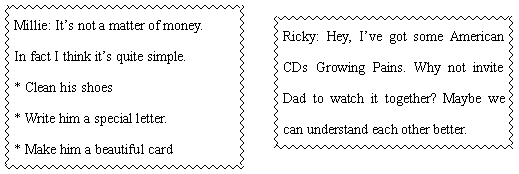
科目: 來(lái)源: 題型:閱讀理解
查看答案和解析>>
科目: 來(lái)源: 題型:閱讀理解
查看答案和解析>>
科目: 來(lái)源: 題型:閱讀理解
查看答案和解析>>
科目: 來(lái)源: 題型:閱讀理解

查看答案和解析>>
科目: 來(lái)源: 題型:閱讀理解
 Smoking in indoor public places including public working places, public transport vehicles and some other special outdoor working places has been banned(禁止)in China since January 2011.Let’s look at the following advantages of banning smoking.
Smoking in indoor public places including public working places, public transport vehicles and some other special outdoor working places has been banned(禁止)in China since January 2011.Let’s look at the following advantages of banning smoking.查看答案和解析>>
科目: 來(lái)源: 題型:閱讀理解
查看答案和解析>>
科目: 來(lái)源: 題型:閱讀理解
查看答案和解析>>
科目: 來(lái)源: 題型:閱讀理解
A poem
| You meet me or not Still there I am standing Not sad not happy You miss me or not Still there my emotions(感情) Not coming not leaving ________①_______ Still there my love Not less not more | You follow me or not Still there my hands in yours Not abandoning (拋棄) Coming into my arms Or Let me stay in your heart Quietly in love ___②___in peace |
查看答案和解析>>
科目: 來(lái)源: 題型:閱讀理解
查看答案和解析>>
科目: 來(lái)源: 題型:閱讀理解
查看答案和解析>>
百度致信 - 練習(xí)冊(cè)列表 - 試題列表
湖北省互聯(lián)網(wǎng)違法和不良信息舉報(bào)平臺(tái) | 網(wǎng)上有害信息舉報(bào)專區(qū) | 電信詐騙舉報(bào)專區(qū) | 涉歷史虛無(wú)主義有害信息舉報(bào)專區(qū) | 涉企侵權(quán)舉報(bào)專區(qū)
違法和不良信息舉報(bào)電話:027-86699610 舉報(bào)郵箱:58377363@163.com